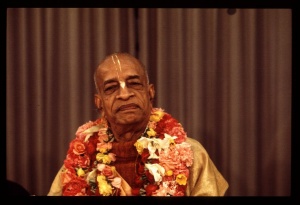CC Madhya 9.305: Difference between revisions
No edit summary |
(Vanibot #0054 edit - transform synonyms into clickable links, which search similar occurrences) |
||
| Line 17: | Line 17: | ||
<div class="synonyms"> | <div class="synonyms"> | ||
''brāhmaṇa-samāja'' | ''[//vanipedia.org/wiki/Special:VaniSearch?s=brāhmaṇa&tab=syno_o&ds=1 brāhmaṇa]-[//vanipedia.org/wiki/Special:VaniSearch?s=samāja&tab=syno_o&ds=1 samāja]'' — the community of ''brāhmaṇas''; ''[//vanipedia.org/wiki/Special:VaniSearch?s=saba&tab=syno_o&ds=1 saba]'' — all; ''[//vanipedia.org/wiki/Special:VaniSearch?s=vaiṣṇava&tab=syno_o&ds=1 vaiṣṇava]-[//vanipedia.org/wiki/Special:VaniSearch?s=carita&tab=syno_o&ds=1 carita]'' — pure devotees; ''[//vanipedia.org/wiki/Special:VaniSearch?s=vaiṣṇava&tab=syno_o&ds=1 vaiṣṇava] [//vanipedia.org/wiki/Special:VaniSearch?s=sakala&tab=syno_o&ds=1 sakala]'' — all the Vaiṣṇavas; ''[//vanipedia.org/wiki/Special:VaniSearch?s=paḍe&tab=syno_o&ds=1 paḍe]'' — study; ''[//vanipedia.org/wiki/Special:VaniSearch?s=kṛṣṇa&tab=syno_o&ds=1 kṛṣṇa]-[//vanipedia.org/wiki/Special:VaniSearch?s=karṇāmṛta&tab=syno_o&ds=1 karṇāmṛta]'' — the ''Kṛṣṇa-karṇāmṛta'' of Bilvamaṅgala Ṭhākura. | ||
</div> | </div> | ||
Latest revision as of 00:08, 20 February 2024
Śrī Caitanya-caritāmṛta - Madhya-līlā - Chapter 9: Lord Śrī Caitanya Mahāprabhu's Travels to the Holy Places

His Divine Grace
A.C. Bhaktivedanta Swami Prabhupada
A.C. Bhaktivedanta Swami Prabhupada
TEXT 305
- brāhmaṇa-samāja saba—vaiṣṇava-carita
- vaiṣṇava sakala paḍe ‘kṛṣṇa-karṇāmṛta’
SYNONYMS
brāhmaṇa-samāja — the community of brāhmaṇas; saba — all; vaiṣṇava-carita — pure devotees; vaiṣṇava sakala — all the Vaiṣṇavas; paḍe — study; kṛṣṇa-karṇāmṛta — the Kṛṣṇa-karṇāmṛta of Bilvamaṅgala Ṭhākura.
TRANSLATION
The brāhmaṇa community there was composed of pure devotees. They regularly studied a book entitled Kṛṣṇa-karṇāmṛta, which was composed by Bilvamaṅgala Ṭhākura.
PURPORT
This book was composed by Bilvamaṅgala Ṭhākura in 112 verses. There are two or three other books bearing the same name, and there are also two commentaries on Bilvamaṅgala’s book. One commentary was written by Kṛṣṇadāsa Kavirāja Gosvāmī and the other by Caitanya dāsa Gosvāmī.